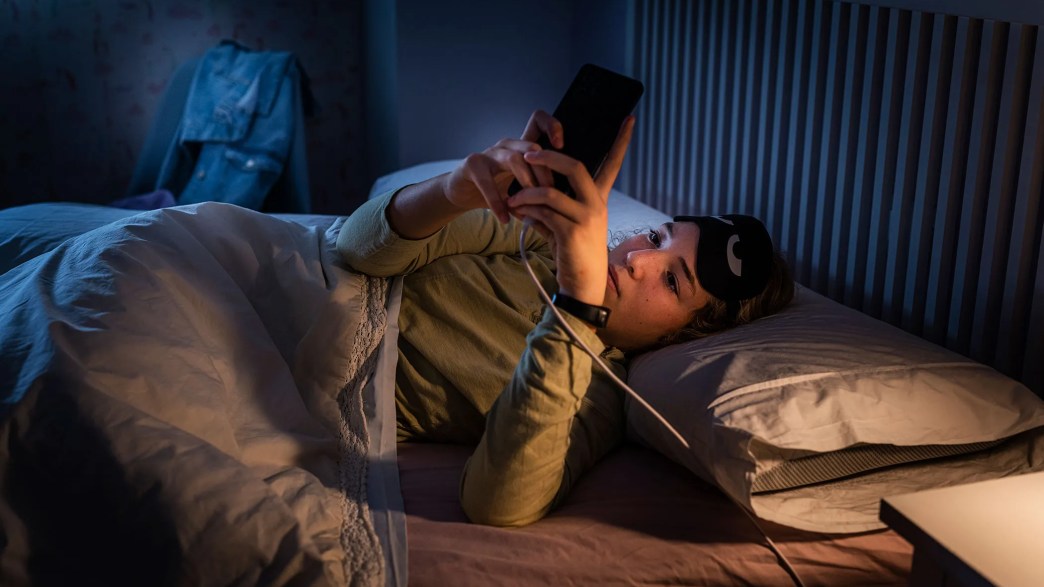The hours spent tossing and turning at night might be doing more than just leaving you groggy the next day. According to groundbreaking research from one of the world’s leading medical institutions, poor sleep could be physically aging your brain at an accelerated rate, potentially adding years to its biological age even as your birthday candles remain the same.
Scientists at the Karolinska Institutet in Sweden have unveiled findings that should make anyone hitting the snooze button sit up and take notice. After analyzing brain scans and sleep patterns of more than 27,000 adults, they discovered something unsettling: people who sleep poorly have brains that look measurably older than they should.
This isn’t just about feeling older or experiencing that familiar brain fog after a restless night. Researchers found that poor sleepers had brains appearing, on average, nearly one full year older than their actual chronological age. Even more concerning, for every point decrease in what scientists call a “healthy sleep score,” brain age increased by approximately six months.
The Science Behind Your Aging Brain
The study, published in the journal eBioMedicine, examined middle-aged and older adults between 40 and 70 years old from the UK Biobank. Using advanced machine learning algorithms and detailed MRI scans, researchers analyzed over 1,000 different brain imaging markers to estimate biological brain age. These markers included loss of brain tissue, thinning of the cortex, and damage to blood vessels.
Abigail Dove, the postdoctoral researcher who led the study at the Department of Neurobiology, Care Sciences and Society, explains the significance of the findings. “The gap between brain age and chronological age widened by about six months for every 1-point decrease in healthy sleep score,” she noted. “People with poor sleep had brains that appeared on average one year older than their actual age.”
But what does it actually mean for a brain to “look older”? While everyone ages chronologically at the same pace, our biological clocks can tick at different speeds. Some people’s bodies and brains age faster than others, influenced by lifestyle factors, genetics, and environmental conditions. Brain imaging technology combined with artificial intelligence now allows scientists to detect these differences with remarkable precision.
Having a brain that appears older than your actual age isn’t merely a cosmetic concern hidden inside your skull. Previous research has connected accelerated brain aging to faster cognitive decline, increased dementia risk, and even higher likelihood of early death. In essence, your brain’s biological age might be a better predictor of your health trajectory than the number of candles on your birthday cake.
The Five Pillars of Sleep Health
Understanding that sleep is complex and multifaceted, the research team didn’t rely on just one measure. Instead, they created a comprehensive “healthy sleep score” based on five distinct characteristics that participants self-reported:
Are you a morning person or a night owl? Your chronotype, the natural inclination toward being active at certain times of day, played a significant role. Do you sleep seven to eight hours per night, the amount considered optimal? Sleep duration mattered considerably. Do you struggle with insomnia, tossing and turning instead of drifting off peacefully? Insomnia was a key factor. Are you a snorer, potentially indicating sleep apnea or other breathing disruptions? Snoring contributed to the assessment. Do you feel excessively drowsy during daylight hours despite sleeping at night? Daytime sleepiness rounded out the five characteristics.
These factors don’t exist in isolation. They interact and influence each other in synergistic ways. Someone battling frequent insomnia likely experiences more daytime sleepiness. A person with a late chronotype might struggle to get adequate sleep duration due to work or family obligations. By integrating all five characteristics into a single score, researchers captured a fuller picture of overall sleep health rather than focusing on any single aspect.
Participants with four or five healthy traits earned a “healthy” sleep profile. Those with two or three received an “intermediate” classification. Anyone with zero or one healthy characteristic fell into the “poor” sleep category. The differences in brain aging across these groups proved striking and consistent.
Late Nights and Wrong Amounts Hit Hardest
While all five sleep characteristics contributed to the overall picture, two stood out as particularly influential. Late chronotype and abnormal sleep duration emerged as the biggest contributors to faster brain aging. Night owls and those sleeping either too little or too much showed the most pronounced effects.
This finding challenges the notion that you can simply “catch up” on sleep during weekends or that being a night person is just a harmless personality quirk. Your body’s internal clock and the amount of rest you get appear to have measurable physical consequences for your brain’s health and longevity.
Inflammation: The Hidden Culprit
How exactly does poor sleep translate into an older-looking brain? The research team investigated this question by examining blood samples collected from participants at the study’s beginning. What they discovered points to a mechanism that health researchers increasingly recognize as central to many chronic diseases: inflammation.
The analysis revealed that inflammation levels in the body accounted for approximately 10 percent of the connection between poor sleep and accelerated brain aging. While 10 percent might not sound overwhelming, it represents just one piece of a larger puzzle. Other biological processes are clearly at work, but inflammation serves as a measurable link between sleep quality and brain health.
Growing evidence suggests that sleep disturbances raise inflammation levels throughout the body. This isn’t the acute inflammation that helps heal a cut or fight off an infection. Instead, it’s a low-grade, chronic inflammatory state that persists over time. This type of inflammation can harm the brain through multiple pathways: damaging blood vessels that supply oxygen and nutrients, triggering the accumulation of toxic proteins associated with Alzheimer’s disease, and accelerating the death of brain cells.
The inflammatory connection helps explain why poor sleep doesn’t just make you tired. It creates a cascade of biological changes that can affect virtually every system in your body, with your brain being particularly vulnerable to long-term damage.
Your Brain’s Overnight Cleaning Crew
Another fascinating explanation centers on what scientists call the glymphatic system. This waste clearance network functions as the brain’s janitorial service, removing metabolic debris and toxic substances that accumulate during waking hours. The catch? This system operates primarily during sleep.
Think of it as your brain taking out the trash every night. When sleep is disrupted or insufficient, the glymphatic system can’t function properly. Harmful substances that should be cleared away instead build up in the brain tissue. Over time, this accumulation may contribute to neurodegenerative diseases and accelerated aging.
Research into the glymphatic system is relatively recent, but it has revolutionized scientists’ understanding of why sleep is so essential. Sleep isn’t merely a period of rest and recovery. It’s an active, critical process during which the brain performs maintenance tasks that can’t happen while you’re awake.
The Domino Effect on Overall Health
Poor sleep might also accelerate brain aging indirectly by increasing the risk of other health conditions that themselves damage brain health. Inadequate or disrupted sleep has been linked to type 2 diabetes, obesity, and cardiovascular disease. Each of these conditions can negatively affect the brain through various mechanisms, from reduced blood flow to increased inflammation to metabolic dysfunction.
This creates a vicious cycle. Poor sleep contributes to these health problems, which in turn may further disrupt sleep quality while simultaneously damaging the brain. Breaking this cycle becomes increasingly difficult the longer it persists, making early intervention crucial.
Small Changes, Significant Impact
The findings might sound alarming, but they also carry an encouraging message: sleep habits are modifiable. Unlike genetic factors or many other influences on brain health, sleep is something most people can improve through behavioral changes and environmental modifications.
“Our findings provide evidence that poor sleep may contribute to accelerated brain aging and point to inflammation as one of the underlying mechanisms,” Dove explained. “Since sleep is modifiable, it may be possible to prevent accelerated brain aging and perhaps even cognitive decline through healthier sleep.”
Simple strategies can make a meaningful difference. Maintaining a regular sleep schedule, even on weekends, helps regulate your body’s internal clock. Limiting caffeine intake in the afternoon and evening prevents stimulants from interfering with your ability to fall asleep. Reducing alcohol consumption, particularly close to bedtime, improves sleep quality even if it initially seems to help you fall asleep faster. Minimizing screen time before bed reduces exposure to blue light that can suppress melatonin production. Creating a dark, quiet, and cool sleep environment optimizes conditions for restful sleep.
None of these interventions requires expensive equipment or medical procedures. They’re accessible, free modifications that anyone can implement starting tonight.
Why a Year Matters
A year of accelerated brain aging might not sound like much in the grand scheme of things. After all, we all age continuously anyway. But in terms of brain health, even small accelerations compound over time and can have significant implications.
Brain aging doesn’t progress linearly. Small increases in biological age can correspond to measurably higher risks of cognitive impairment, dementia, and other neurological conditions. A brain that’s aging one year faster than it should means reaching critical thresholds for disease risk that much sooner. Over the course of decades, these effects accumulate.
Additionally, the study captured just a snapshot in time. Someone who has consistently poor sleep throughout middle age and beyond isn’t experiencing just one year of accelerated aging. They’re potentially adding months or years to their brain’s biological age year after year, creating a widening gap between how old their brain looks and how old they actually are.
The Broader Context
This research represents one of the largest and most comprehensive investigations of its kind, benefiting from a massive study population, multidimensional assessment of sleep health, and detailed estimation of brain age through thousands of MRI features. Previous research had connected poor sleep to cognitive decline and dementia risk, but this study takes the additional step of demonstrating that poor sleep is tied to measurable structural changes in the brain itself.
The UK Biobank participants tend to be healthier than the general UK population, which could limit how broadly these findings apply. Another limitation involves the reliance on self-reported sleep data rather than objective measurements. Despite these constraints, the size of the study and the consistency of the findings provide robust evidence for the sleep-brain aging connection.
Taking Control of Your Brain’s Future
We spend nearly a third of our lives asleep, yet sleep often gets treated as wasted time or a luxury to be sacrificed when life gets busy. This research reinforces what sleep scientists have been saying for years: sleep is not optional downtime. It’s an essential biological process that protects and restores the brain.
Brain aging cannot be avoided entirely. Every brain will age, and that’s a normal part of the human experience. However, the rate and manner in which aging unfolds can be shaped by behavior and lifestyle choices. Sleep represents one of the most powerful tools available for influencing the trajectory of brain health.
The implications are straightforward yet profound. To keep the brain healthier for longer, sleep must be prioritized rather than sacrificed. Those extra hours spent working late, scrolling through social media, or binge-watching another series might be costing more than just tomorrow’s energy. They could be adding biological years to the brain, years that translate into tangible health consequences down the road.
The good news? It’s never too late to start sleeping better. Even small improvements in sleep quality and duration can make a difference. Your brain will thank you for it, not just tomorrow morning, but potentially years and decades into the future.















